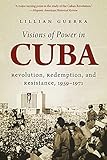Visions of Power in Cuba Revolution, Redemption, and Resistance, 1959-1971 / Lillian Guerra.
Material type: TextLanguage: English Series: Envisioning Cuba | Envisioning CubaPublisher: Chapel Hill : University of North Carolina Press, 2012Manufacturer: Baltimore, Md. : Project MUSE, 2013Copyright date: ©2012Description: 1 online resource (488 p.) 24 cmContent type:
TextLanguage: English Series: Envisioning Cuba | Envisioning CubaPublisher: Chapel Hill : University of North Carolina Press, 2012Manufacturer: Baltimore, Md. : Project MUSE, 2013Copyright date: ©2012Description: 1 online resource (488 p.) 24 cmContent type: - text
- computer
- online resource
- 9781469618869
- 972.9106/4 23
- 107 F 1788 G934v 2012
| Item type | Current library | Home library | Collection | Shelving location | Call number | Copy number | Status | Date due | Barcode |
|---|---|---|---|---|---|---|---|---|---|
 Libro
Libro
|
Biblioteca Juan Bosch | Biblioteca Juan Bosch | Recursos Regionales | Recursos Regionales (2do. Piso) | 107 F 1788 G934v 2012 (Browse shelf(Opens below)) | 1 | Available | 00000146656 |
Description based upon print version of record.
Includes bibliographical references and index.
Introduction : "Today, even Fidel is a counterrevolutionary!" : excavating the grand narrative of the Cuban Revolution -- The olive green revolution : media, mass rallies, agrarian reform, and the birth of the Fidelista state -- Good Cubans, bad Cubans, and the trappings of revolutionary faith -- War of words : laying the groundwork for radicalization -- Turning the world upside down : Fidelismo as a cultural religion and national crisis as a way of life -- Resistance, repression, and co-optation among the revolution's chosen people -- Class war and complicity in a grassroots dictatorship : gusanos, citizen-spies, and the early role of Cuban youth -- Juventud rebelde : nonconformity, gender, and the struggle to control revolutionary youth -- Self-styled revolutionaries : forgotten struggles for social change and the problem of unintended dissidence -- The ofensiva revolucionaria and the zafra de los diez millones : inducing popular euphoria, fraying Fidelismo -- The reel, real, and hyper-real revolution : self-representation and political performance in everyday life -- Epilogue : the revolution that might have been and the revolution that was : memory, amnesia, and history.
In the tumultuous first decade of the Cuban Revolution, Fidel Castro and other leaders saturated the media with altruistic images of themselves in a campaign to win the hearts of Cuba's six million citizens. In Visions of Power in Cuba, Lillian Guerra argues that these visual representations explained rapidly occurring events and encouraged radical change and mutual self-sacrifice. Mass rallies and labor mobilizations of unprecedented scale produced tangible evidence of what Fidel Castro called ""unanimous support"" for a revolution whose ""moral power"" defied U.S. control. Yet p
English
Description based on print version record.


There are no comments on this title.